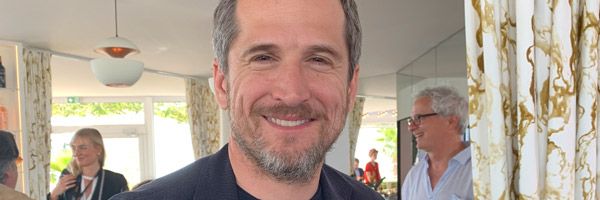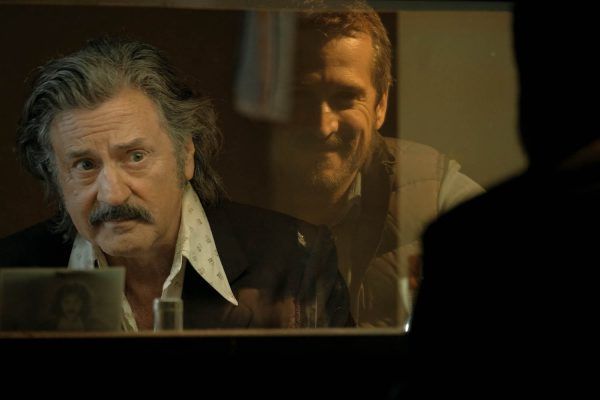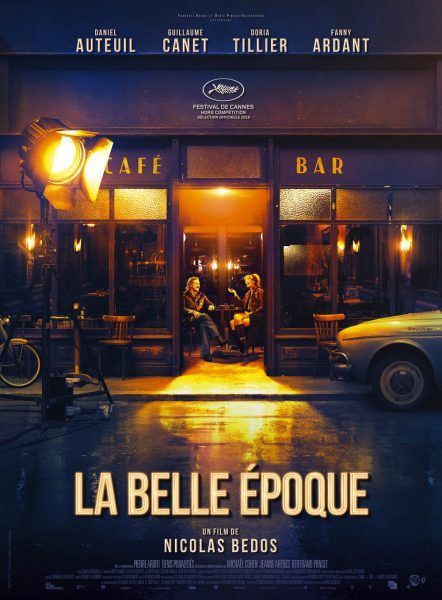Guillaume Canet stars in Nicholas Bedos’sLa Belle Epoque, a sharp, accomplished, highly commercial French farce. Harking back to major Gaellic productions from the past—which are rarely made these days--it looks set to be a resounding international hit.
Although screening out of competition La Belle Epoque is one of the best films at the Cannes Film Festival. Canet plays a director who has set up a company allowing clients to venture back into their favourite time period which he re-creates immaculately in the manner that the French do so well. Or like Woody Allen achieved in Midnight in Paris. Daniel Auteuil (from the monumental Jean de Florette and Manon des Sources) shines in the leading role of a man who wants to reclaim the best days of his youth, when he met the woman he would love and marry (Fanny Ardant). Instead he falls for the actress playing her, the stunning Doria Tiller, a true discovery at the festival.
It’s Canet though whose career is on fire. His latest directing effort Little White Lies 2, a film starring many of his close friends including his wife and constant collaborator Marion Cotillard and buddy Gilles Lellouche, is currently a French box office hit. The original grossed US$48.5 in France while Lellouche’s Sink or Swim, a Cannes entry last year, has made $36.4 million.
Canet may be one of France’s biggest stars, but he remains as affable as when I first met him many years ago. And at 46 he retains that boyish smile. We spoke the day after La Belle Epoque’s premiere when he admitted to being a team player—and a bit of a workaholic.
Comedic films like La Belle Epoque generally are not up for awards. You must feel that with some of the films you directed like 2017’s hilarious Rock’n Roll (he and Cotillard played husband and wife), which didn't travel much beyond France.
GUILLAUME CANET: No not that much, I agree with you. It’s always a bit frustrating not to have your film seen that much. But I have to admit I didn't have time to travel with the movie and it’s always easier with distributors to show movies in foreign countries when the director or talent come. I’ll of course do that with Little White Lies 2.
It’s interesting that you are playing a director in La Belle Epoque.
GUILLAUME CANET: It was exciting for me to play the part because as a director you don't usually see the energy you expend. You focus on the other people. So to be looking at myself, at my energy, my passion, was wonderful and the writing was absolutely brilliant. I realised I share many of his traits of not leaving anything to chance and focusing on the details. What touched me were the love stories. One was very passionate and one had sort of run out of steam. But the idea was to reignite the passion in the first relationship. My character has an interesting relationship with the character played by Daniel. He’s a sort of a mentor. What I find beautiful is that the character I play has a mission to ensure that a person finds happiness again. Nothing is abnormal and something inhabits him, which I found very important. A whole period is being reconstituted but everything sprang from a passion, a deep-seated love.
Are you going to see Leonardo DiCaprio in Cannes? Have you maintained your friendship with him? (They met on The Beach (2000) and at one point DiCaprio had planned to produce an English-language remake of Canet’s first film, Whatever You Say (Mon Idole), but it didn't happen.)
GUILLAUME CANET: Yeah we are still very close. I can’t wait to see that (Tarantino) film.
He didn't come to your party last night. He would have been a bit of a scenestealer.
GUILLAUME CANET: No he didn’t come. He invited me to another party but I tried to explain to him that I couldn’t leave the party for my movie. I didn't want to leave like that. But I’m going to see him tonight.
Are you going to collaborate with him again?
GUILLAUME CANET: I would like to direct a movie one day with him. Maybe when he is older and less expensive!
You have your own incredible set-up working with your group of friends in France.
GUILLAUME CANET: Yes, Gilles Lellouche, Jean Dujardin and myself. We’re a group of friends who are making films and playing in each other’s movies and sharing things. I think that's very, very nice. Sometimes critics ask me if I’m bored making films with the same people.
And your wife.
GUILLAUME CANET: And my wife. I think it’s on the contrary. It's a great chance that we have, loving each other and sharing things and helping each other. It’s better than being alone in this job.
Do you have any criticism about the era we are living in now?
GUILLAUME CANET: My biggest criticism I would make today is to unfortunately realise how many people we have to convince that we are fucking up our world. For example in 11 years there will be no more water in North Africa, so you can imagine what’s going to happen. People will have to move to find water and some people are going to be happy to have them and some people are not going to be happy. It’s going to cause a lot of problems.
Leo has also come to Cannes with Ice on Fire an environmental documentary he produced. Maybe you can make an environmental feature?
GUILLAUME CANET: I’m thinking of it a lot, particularly if I made a documentary. I think it's a really good idea. I ask myself what would be interesting to do but I’m going to stop talking to you because I’d love to keep that idea for myself. What is really interesting is to convince people that everything’s not ok just because we have good weather.
Do movies have the power to affect change?
GUILLAUME CANET: Of course. You get emotional when you are touched by movies and you live with the memories of the film. I know that I’ve learned a lot of things from films. I wasn't a good student; I hated school. It was only a long time later that I realised it was important for me to know a lot of things, but I grew up watching movies and I had a feeling I was learning lot of things about life, about love, about conflict and about relationships from films. So I think it’s really important that nowadays some documentary films are made to help people understand certain things.



